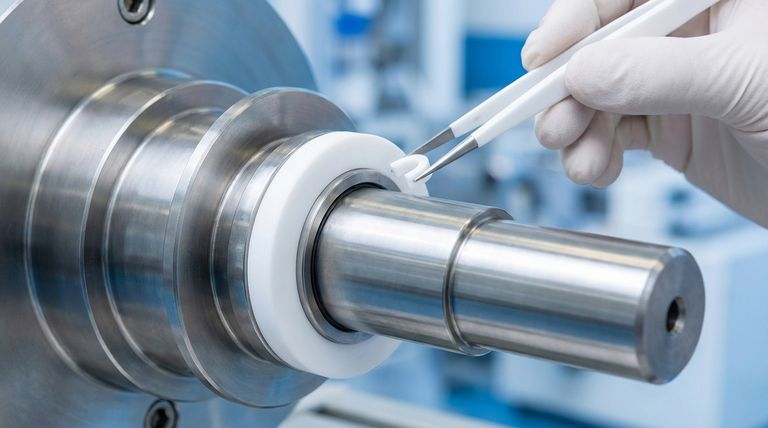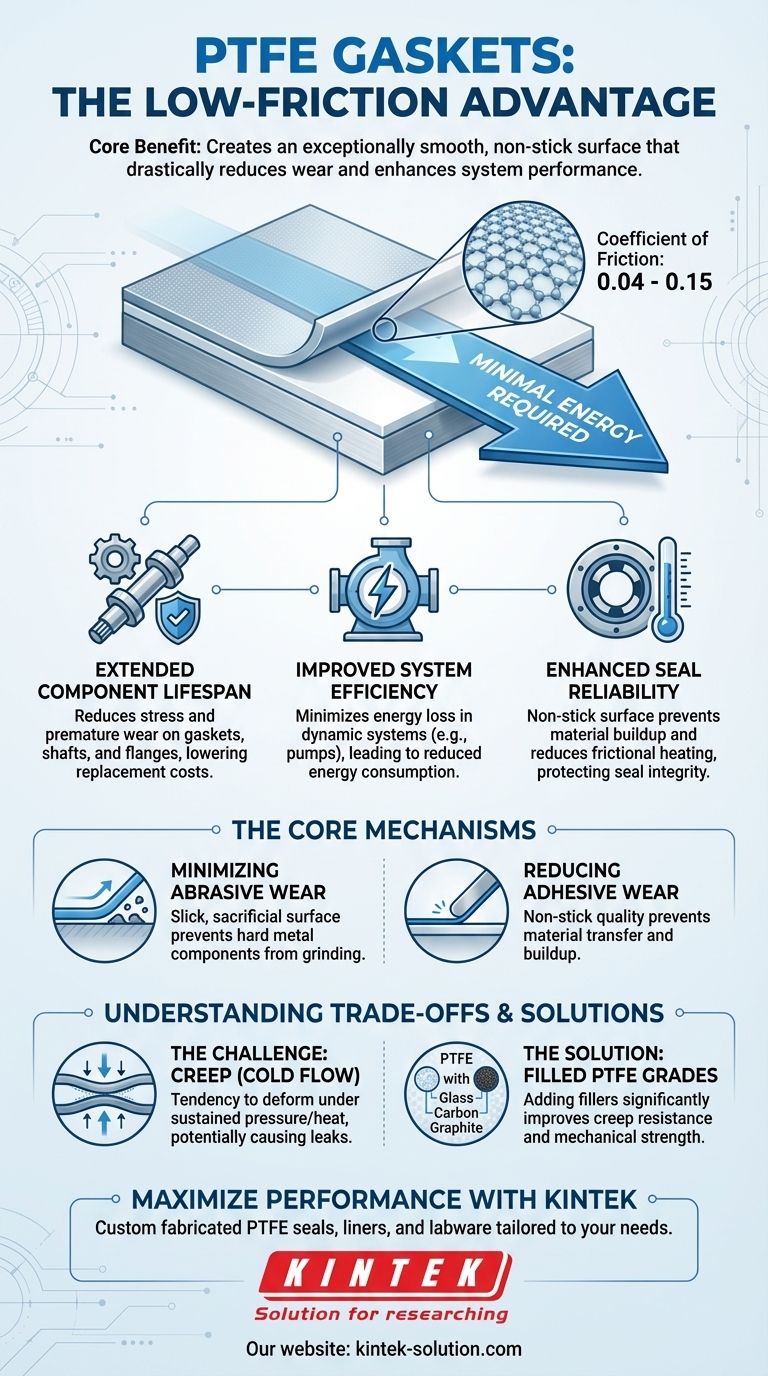Fundamentally, the low coefficient of friction in PTFE gaskets creates an exceptionally smooth, non-stick surface that dramatically reduces wear on both the gasket and the equipment it seals. This single property directly translates into a longer service life for all components, enhances the reliability of the seal over time, and improves the overall efficiency of the mechanical system.
The core value of PTFE's low friction extends beyond simply preserving the gasket itself. It acts as a protective measure for the entire mechanical assembly, minimizing energy loss, reducing maintenance costs, and ensuring greater operational reliability.

The Core Mechanisms of Low Friction
PTFE's unique molecular structure is responsible for one of the lowest coefficients of friction of any solid material. Understanding how this property works is key to appreciating its benefits in an industrial or mechanical context.
Defining the Coefficient of Friction
The coefficient of friction is a value that represents the ratio of the force of friction between two bodies and the force pressing them together. For PTFE, this value is exceptionally low, typically ranging from 0.04 to 0.15. This means very little energy is required to move a surface against it.
Minimizing Abrasive Wear
Abrasive wear occurs when a harder surface scrapes or grinds against a softer one. Because PTFE is so smooth, it provides a slick, sacrificial surface that prevents the much harder, and often more expensive, metal components from grinding against each other.
Reducing Adhesive Wear (The Non-Stick Quality)
PTFE's low-friction nature also makes it highly non-stick. In dynamic applications, this prevents material from the gasket or the mating surface from transferring and building up, a process that can lead to increased friction, heat, and eventual component failure.
Tangible Benefits in Sealing Applications
The theoretical advantage of low friction translates into several practical, high-value outcomes for sealed systems, particularly those involving movement.
Extended Component Lifespan
The most direct benefit is a significant increase in the service life of both the gasket and the mating parts. By reducing the constant stress of friction, PTFE gaskets help prevent premature wear and tear on shafts, flanges, and other critical surfaces, thereby lowering replacement costs.
Improved System Efficiency
In any system with moving parts, friction is a source of energy loss. PTFE's slick surface minimizes this loss, allowing machinery to operate more efficiently. In applications like pumps or rotating equipment, this can lead to tangible reductions in energy consumption.
Enhanced Seal Reliability
The non-stick surface allows for a smoother, more consistent installation without damaging the gasket. In dynamic seals, it reduces frictional heating, which can degrade other sealing materials and compromise the seal's integrity over time.
Understanding the Trade-offs
While its low friction is a tremendous asset, PTFE is not universally perfect for every application. An objective assessment requires acknowledging its limitations.
The Challenge of Creep (Cold Flow)
Standard PTFE has a tendency to "creep" or cold flow under sustained pressure, especially at higher temperatures. This means the material can slowly deform, potentially reducing the sealing pressure on a flange and leading to leaks over time.
The Solution: Filled PTFE Grades
To counteract creep, manufacturers often add fillers like glass, carbon, or graphite to the PTFE. These fillers significantly improve creep resistance and mechanical strength, though they can slightly increase the coefficient of friction compared to virgin PTFE. The choice of filler depends on the specific chemical and thermal demands of the application.
Making the Right Choice for Your Application
Selecting the right gasket material involves matching its properties to your primary operational goal.
- If your primary focus is equipment longevity and reducing maintenance: PTFE's ability to protect expensive mating surfaces from wear is its most compelling feature.
- If your primary focus is energy efficiency in a dynamic system: PTFE's exceptionally low friction minimizes wasted energy, making it an ideal choice for rotating or sliding applications.
- If your primary focus is a high-pressure, static seal: You must consider the potential for creep and specify a filled PTFE grade to ensure long-term seal integrity.
Ultimately, leveraging PTFE's low friction is about transitioning from simple component protection to enhancing the performance and reliability of the entire system.
Summary Table:
| Benefit | Impact |
|---|---|
| Extended Component Lifespan | Reduces wear on gaskets and mating parts, lowering replacement costs. |
| Improved System Efficiency | Minimizes energy loss in dynamic systems, reducing operational costs. |
| Enhanced Seal Reliability | Provides a non-stick surface for consistent installation and reduces frictional heating. |
Maximize the performance and longevity of your equipment with KINTEK's precision PTFE components.
Our expertise in custom fabricating PTFE seals, liners, and labware ensures you get a solution tailored to your specific needs—whether you're in the semiconductor, medical, laboratory, or industrial sector. We help you leverage the low friction of PTFE to reduce maintenance, improve efficiency, and enhance system reliability.
Contact KINTEK today to discuss your project, from prototypes to high-volume orders, and discover the value of working with a partner dedicated to precision and performance.
Visual Guide

Related Products
- Custom PTFE Parts Manufacturer for Teflon Parts and PTFE Tweezers
- Custom PTFE Parts Manufacturer for Teflon Containers and Components
- Customizable PTFE Seals Filter Holders for Versatile Applications
- Custom PTFE Sealing Tapes for Industrial and High Tech Applications
- Customizable PTFE Rods for Advanced Industrial Applications
People Also Ask
- What industrial benefits do PTFE-machined parts offer? Achieve Peak Performance in Demanding Applications
- What are the unique properties of PTFE? Unlock Unmatched Performance in Demanding Applications
- What design considerations are important for custom PTFE parts? Design for Performance & Reliability
- What challenges arise when machining PTFE (Teflon)? Overcome Softness, Heat, and Instability
- What fabrication services are available for PTFE? Shearing, Stamping, Laser Cutting, Molding & Machining



















